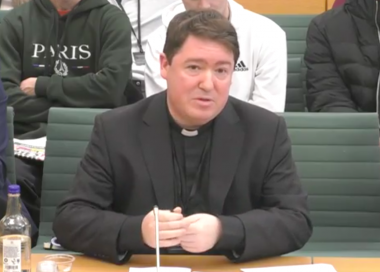
A former Church of England priest has claimed that interest in baptism among asylum seekers “melted away” after he asked them to demonstrate their commitment to the church.
Rev Matthew Firth was giving evidence to the Home Affairs Select Committee on Tuesday about his experience as a priest at St Cuthbert’s and Holy Trinity in Darlington, where he served between 2018 and 2020 before joining the Free Church of England.
The committee was hearing evidence on asylum seeker conversions to Christianity after it was suggested that churches – and specifically the Church of England – may be complicit in the use of fake conversions to game the system.
Rev Firth said that during his two years at St Cuthbert’s, “cohorts” of around six to seven mainly young Iranian and Syrian men were being brought to him for baptism every few weeks.
He told the committee that after his arrival to the church, he honoured baptisms that had already been booked but “pressed a pause button” on any others because he found the numbers “surprising”.
“You spot a pattern and you think, hang on, there’s something going on here,” he said.
He said that after introducing a more “rigorous” process to make sure they were coming to church regularly and getting involved in the life of the church, the numbers showing an interest in baptism “fell off a cliff”.
“That was the thing that kind of made the numbers fall off a cliff in a sense because those people kind of melted away really. They weren’t really wanting to get involved with the life of the church so much after I requested them to do so,” he told the committee.
Speaking later at the hearing, the Bishop of Chelmsford, Guli Francis-Dehqani, denied that the Church of England was allowing asylum seekers to scam the system but said she would like to see clergy guidelines reviewed in the near future.
“It’s certainly true that there are some churches that are experiencing a larger number of asylum seekers than others – places like Liverpool and others … I believe that’s largely because that’s where asylum seekers are themselves placed,” she said.
“Our churches respond to local needs however it presents itself and if it happens to be in an area where there are large numbers of asylum seekers – who incidentally, in the kind of increasingly hostile environment, it’s perhaps not surprising that if they find a place of warmth and welcome may well be drawn to it.
“But that’s a totally separate issue to saying that we are kind of quickly and easily and freely baptising large numbers in order to scam the asylum process which is properly the responsibility of the government, the Home Office, the courts, the tribunals.
“We need to play our part honestly and truthfully but with that extension of Christian warmth and hospitality and welcome that is our responsibility.”